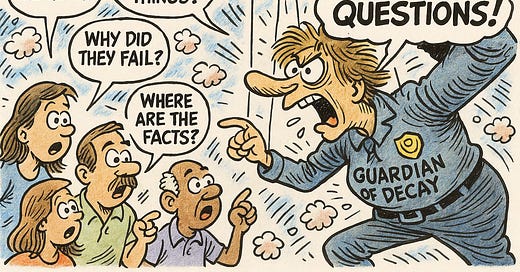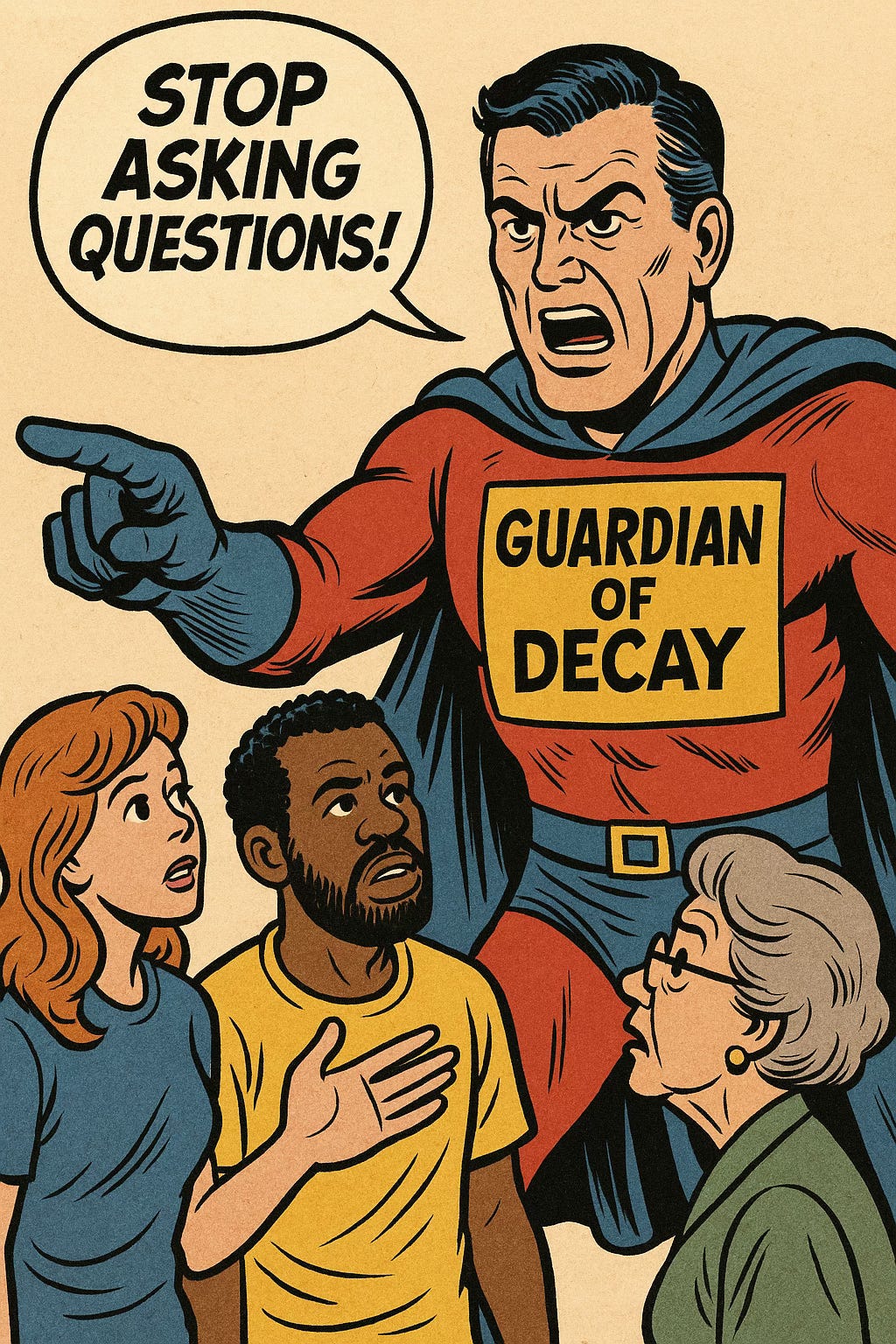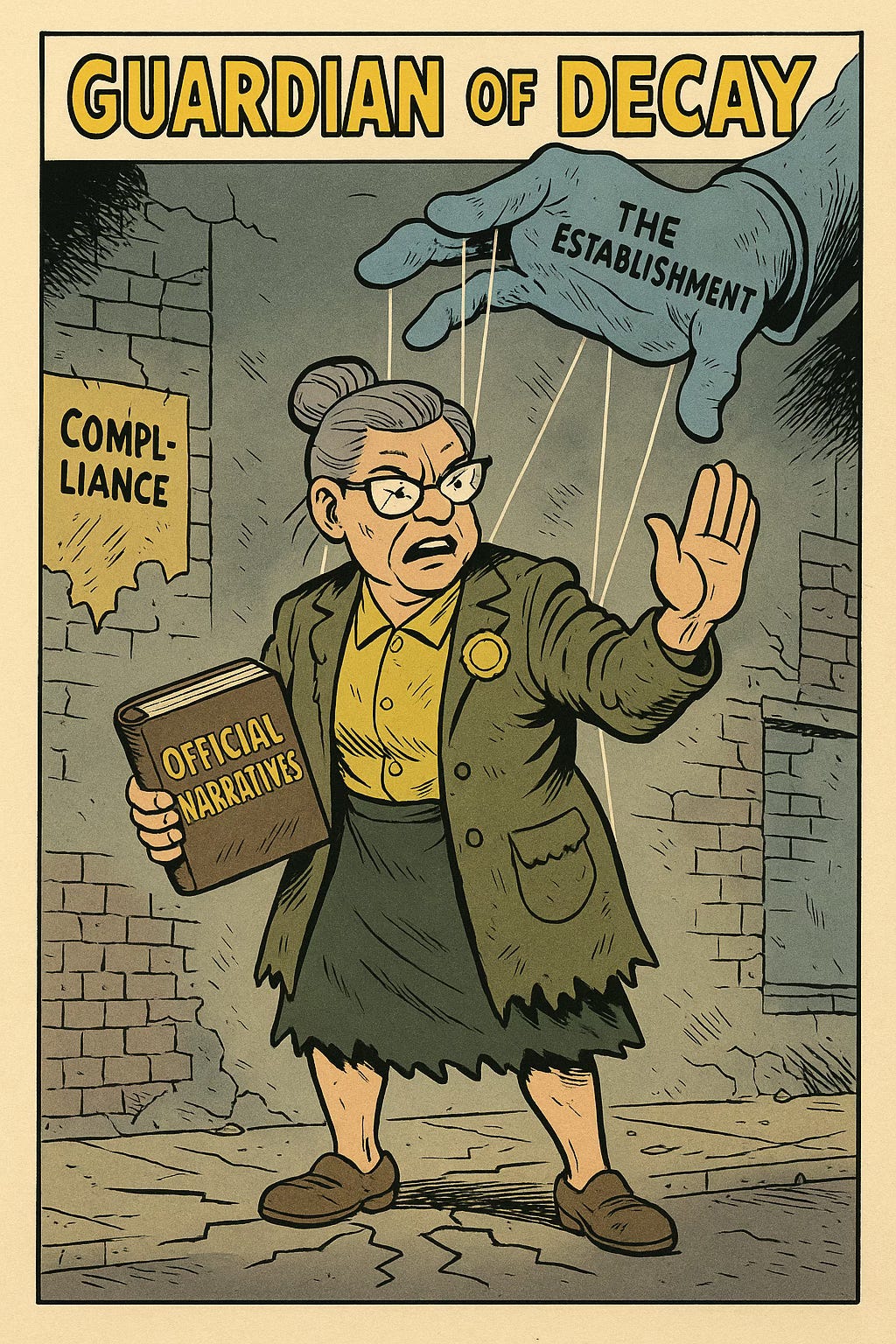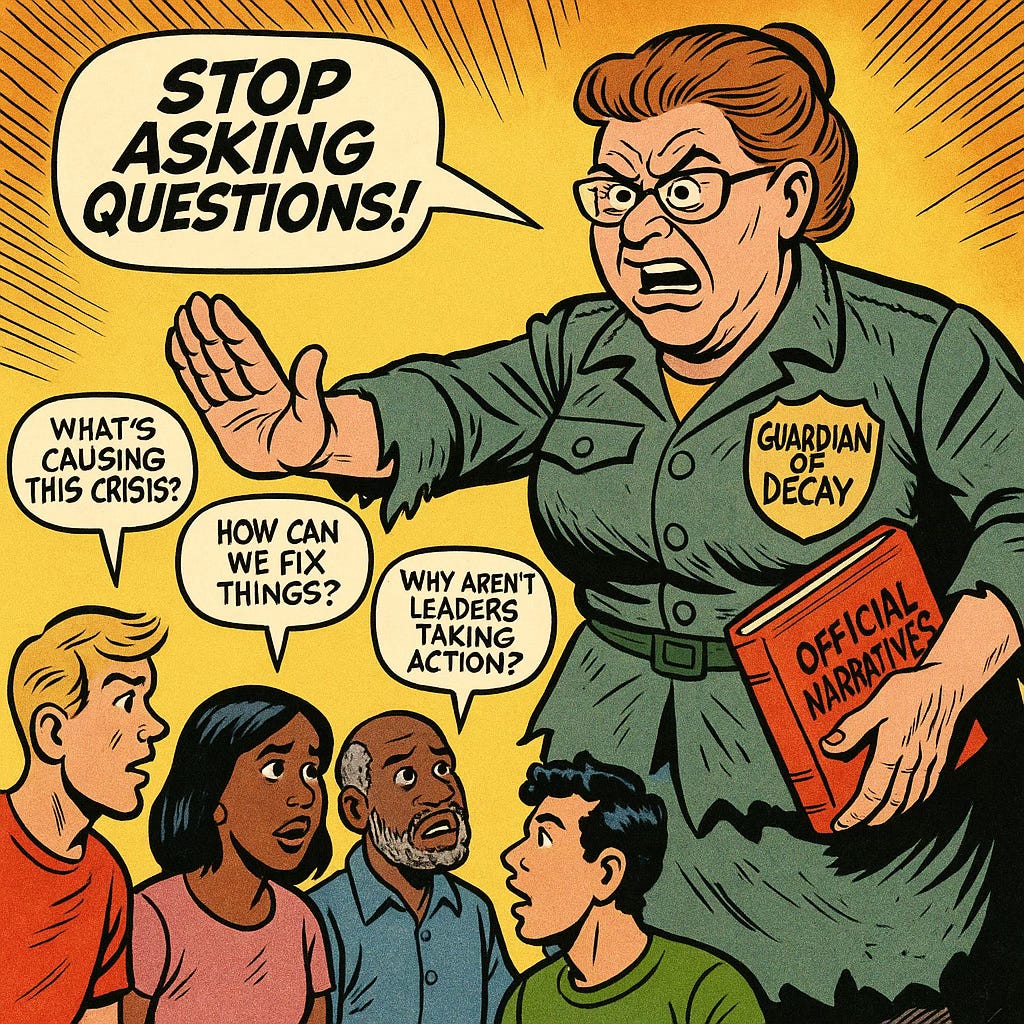There comes a moment in every failing system when something predictable happens. Just as the cracks widen and the contradictions grow harder to ignore, a familiar figure emerges, not to repair or reform but to preserve the rot.
This is the Guardian of Decay. They do not fight for truth or change. They exist to protect collapsing institutions from honest inquiry.
They wear the mask of healer, expert, or peacemaker, but their true role is to defend the status quo, not through reason, but through pressure, confusion, and emotional control.
What Is a Guardian of Decay?
A Guardian of Decay can be anyone. They might be credentialed, institutional, or self-appointed. Their role isn't assigned; it's performed, often without self-awareness. What unites them is this: when a system begins to fail, they respond not by seeking the truth of its condition but by trying to silence the discomfort of exposure. They don't ask if the structure should fall. They ask how long they can keep others from noticing.
The Guardians of Decay appear in schools, hospitals, newsrooms, governments, therapy offices, and online forums.
They are not part of any one profession. They appear wherever systems that once conferred identity, security, or status are now being questioned. Their loyalty is not to reality but to the system that gave them meaning.
The Tactical Patterns of the Guardian of Decay
Guardians of Decay do not make rational cases for preservation. They use patterns, repeated, often unconscious moves, that suppress inquiry and short-circuit thought.
The most common is emotional coercion. Guardians of Decay often flood the space with fear, guilt, and manufactured fatigue. They try to make questioning feel shameful, dangerous, or exhausting. The goal is to associate critical thought with social disruption as if asking what's true is itself the problem.
Next is the relentless use of logical fallacies. Rather than engaging directly, they redirect. Guardians of Decay exaggerate your position into something absurd, then argue against that version. They declare neutrality while smuggling in the outdated assumptions of the system they are protecting. They rely on circular reasoning, where the system's authority is proof of its truth. They load their attacks with logical fallacies until the original question is buried.
They also invoke credentialism. Guardians of Decay often rely on titles, degrees, and affiliations to demand submission and obedience. They insist you trust their status, not their reasoning. Their message is clear: do not think, defer. This tactic thrives on the cultural habit of outsourcing judgment to "experts," even when they cannot explain or defend their positions in plain terms, with even the most elementary logic.
Another core pattern is the suppression of inquiry. Serious, good-faith questions are recast as negativity, division, or even violence.
Guardians of Decay shift the frame from "What's true?" to "Why are you asking that?" They imply that the very act of noticing failure is an act of betrayal.
Then there is guilt shaming. Guardians of Decay target those who have energy, actual skin in the game, and clarity and try to drag them into surrender. They suggest that asking for change is selfish or unkind and that raising hard truths is inconsiderate to those who want stability. They reframe discomfort as harm and insist that your insistence on truth is hurting the group.
This leads to a false appeal to unity. Guardians of Decay say that "healing" or "community" is needed now, which often means suppressing conflict instead of resolving it.
They redefine loyalty to people as loyalty to the institutions that claim to represent them. Questioning becomes disloyalty. Reform becomes an attack.
Another frequent tactic is tribal signaling masked as neutrality. They pretend to speak as neutral observers, yet their assumptions align perfectly with the dominant institutions, often academic, political, medical or corporate. They invoke broad values like "science," "compassion," or "civility," but only in ways that defend the status quo. Their projections of "objectivity" are a delusion.
Finally, they work overtime to delegitimize reformers. Guardians of Decay rarely engage reformers' actual arguments. Instead, they move to question their character, stability, or motives. They don't want to debate ideas; they want to mark the reformer as dangerous, broken, or ungrateful—someone whose voice doesn't deserve to be heard.
Why the Guardian of Decay Emerges
Guardians of Decay act from fear, not strength. Their identity is tethered to the system they protect. If the system fails, they lose more than a job or a credential; they lose meaning. They lose the story they've been living inside.
To preserve that narrative, they suppress reality.
They wrap their fear in therapeutic language or academic jargon, but underneath, it's the same: the system's collapse threatens their sense of self. So they fight, not for the good of others, but to preserve the illusion of order in which their place still exists.
How to Defend Yourself Against The Guardians of Decay
The most crucial move is to recognize their patterns. Don't get caught in personal disputes. See the system operating through the person. Once you see the pattern, you can break its hold.
Remember, and we say this all the time here on The Whirl of Reorientation:
Once you see it, you can’t unsee it!
Stay rooted in inquiry. Never apologize for asking real questions. Don't let emotional manipulation blur the line between discomfort and harm. Refuse false choices between truth and unity. You are not required to choose between honesty and belonging.
Guard your stamina. Guardians of Decay aim to exhaust.
They want you to walk away not because you were wrong but because you're tired. That's how they win. But if you keep your composure and hold your frame, their tactics collapse. They expose themselves by what they try to silence.
The Guardian of Decay cannot stand in the light of sustained clarity. You don't have to attack them. You have to outlast the illusion.
The Road Ahead
This moment is not just political; it's structural. Education, media, public health, mental health, finance, and governance are all experiencing deep legitimacy loss. Their contradictions are too visible to ignore. As a result, the Guardians of Decay are activated and active everywhere.
They won't stop the collapse, but they will make noise, moralize, and accuse.
They will say that inquiry is dangerous. That adaptation is disloyal. That truth is cruelty.
They will be loud. And they will lose.
The future does not belong to those who cling to decay.
It belongs to critical thinkers who strive to keep their minds free.
They will continue this work by identifying the patterns, resisting the frames, and reorienting themselves to what's real.
No matter who demands their silence.
Public Enemy Tried to Teach Us in 1990. Were You Listening?
Thirty-five years ago, something shifted for me. Thirty-five years later, its impact can still be felt. Profoundly. And the many lessons can be shared and taught to leaders and their teams.
Unveiling An Illusion
Note to Reader: I have spent a long time in and around capital markets in various capacities. I made a lot of observations and took a lot of notes. What follows is one of those, and there are a lot more where this came from. Capital markets are a tremendous place to apply John Boyd’s theories!










This is a great article. 👍
Nidhogg is as essential to the world as Yggdrasil.